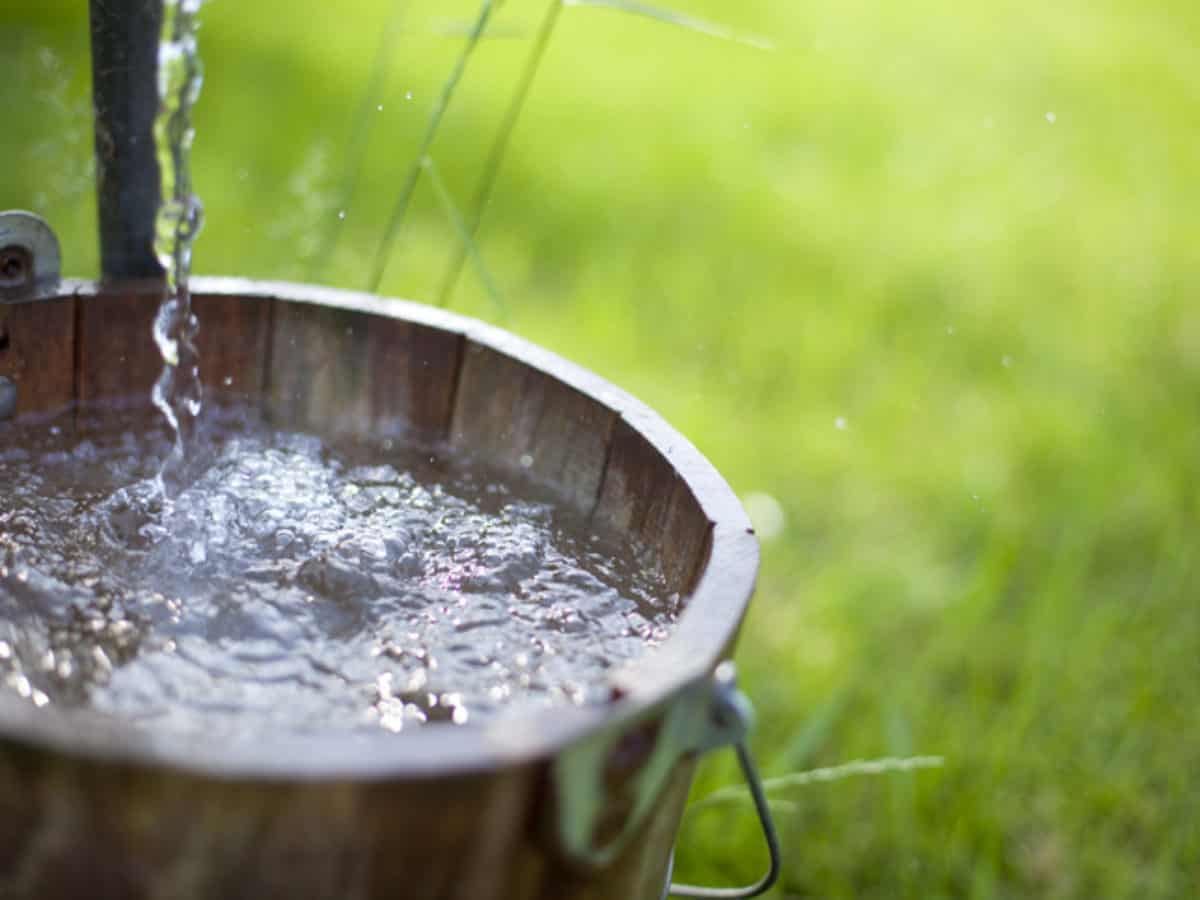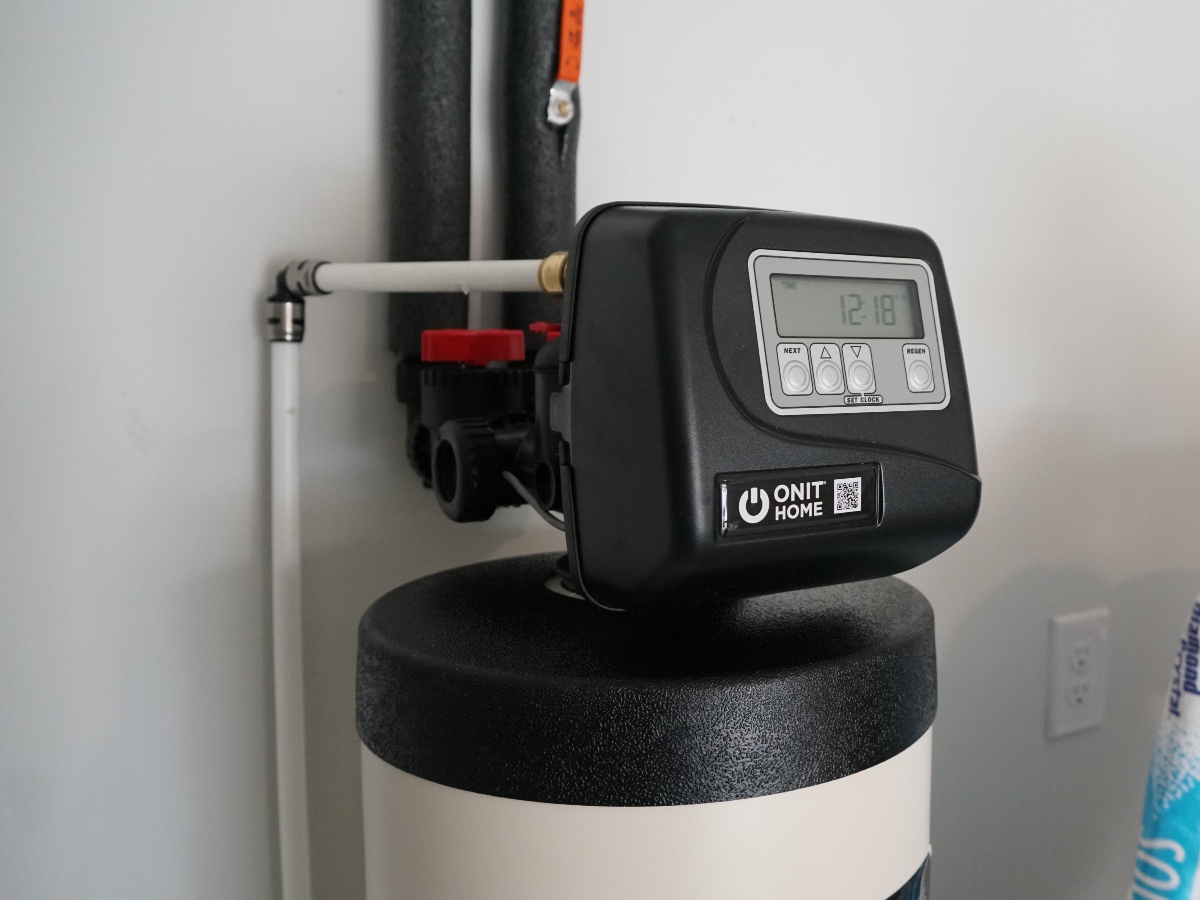Many homeowners who don’t live within the city limits have to be aware of what’s in the well water used as the family water supply. Iron in well water is a fairly common occurrence, with two distinct types of iron possibly appearing in your water supply.
Ferric iron will impart a reddish color to your water, since it consists of clear well water that has been exposed to oxygen. The rust color that forms can be clearly seen by any observer. Ferrous iron in your water will still leave the water clear and it does not form in the water the same way that ferric iron does.
Instead, ferrous iron generally finds its way into your well water from deeper water sources. It’s also possible that ferrous iron invades your well from a deeper well that you may be connected to. In this article, we’ll discuss how iron gets into your well water, and what the health hazards are if any. We’ll also discuss some steps you can take to keep your water supply free of iron.
What is Well Water?
Well water is basically water that comes from a source deep in the ground, and a well is made by digging deep enough until you reach an aquifer. An aquifer is a layer of permeable rock which contains a fairly reliable supply of water. When you connect with an aquifer, a pump can be installed into the well where it can deliver water to a household.
While this is a free source of reliable water, there are some drawbacks to using well water. Since it is not part of the public water supply, well water is not tested at all, unless by the well owner. Roughly 13% of all Americans rely on well water for all their water needs. This amounts to approximately 40 million Americans, so it is a considerable percentage of all water consumers.
In many parts of the world where public water supplies are not available, wells are the only source of water. In order to create a well, there are three basic ways of drilling to create one.
Bored Wells
Bored Wells use a high-powered piece of equipment like a backhoe to dig down to an aquifer. After having connected with the aquifer, a bored well must be lined with stones, tiles, or bricks for reinforcement.
Typically, a bored well goes no deeper than about 30 feet deep.
Driven Well
A driven well makes use of a pipe that goes deep into the ground. This pipe will be driven down until it reaches an aquifer, and that could be somewhere between 30 and 50 feet.
Drilled Wells
The last type of well is a drilled well, and for this, a rotary drilling machine is generally necessary.
Drilled wells must also be reinforced because they go hundreds and sometimes thousands of feet deep to reach an aquifer. Homeowners have to take steps to protect their water supply, because the water is not filtered like city water is, and that can cause some problems.
There could be contaminants in the water that are harmful to the users’ health. Depending on the mineral content in the well water, it could stain your clothing. It can also cause your appliances to break down faster, especially when they use water for some aspect of their function. So, well water has some pros and cons to it, and as a homeowner, you must be aware of these. Before using well water as a constant supply source, it should always be tested.

How Does Iron Get Into Well Water?
There are basically two ways that iron can get into your well water to cause problems for your household. The first way is via seepage, and this allows water from the surface to get into the well’s water supply. It could be from rain or melted snow, but this moisture will gradually make its way through the soil into your well. As it travels through the ground, iron in the soil often dissolves into the water and follows it right into the well.
The other main way that iron gets into your water supply is through the piping used to extract water from the well. Most of the casings and pipes used for well water are made of iron. When exposed to water and oxygen, iron can deteriorate and oxidize. That will form a natural by-product of rust, which can easily flake off into the water as it travels through pipes. That water containing iron and rust is then delivered into the household water supply.
Is Well Water With Iron Harmful to Your Health?
Iron is actually essential to human health, and as it turns out, it’s one of the most common minerals available all around the globe. Iron is what gives blood its red color and iron actually assists the blood so that it can carry oxygen. From this, it can be understood that iron itself does not pose any kind of health risk to humans.
However, the presence of iron in well water may attract some kinds of iron-feeding bacteria which may be present in a water supply. If you have iron in your water source, it’s very possible that these harmful bacteria are also present, because they’re highly attracted to the iron component. While it may not pose any health risks on its own to humans, iron can cause other problems for homeowners.
Household Signs You Have Iron
For instance, it can cause stains on your dishes, your laundry, and any plumbing fixtures you have installed. It can also create a metallic taste that most people find repulsive. There’s a possibility that the high iron content in your water supply can lead to clogs in your well or in your pumps.
In some cases, the iron present in well water will cause damage to household appliances, shortening their useful shelf life. You can often detect iron in your well water by seeing a yellow or reddish color in the water. If you find that your water supply does have some degree of iron content, it can be removed using various kinds of treatment.
You can use sediment filters, water-softening equipment, chemical treatments, or even shock chlorination. If you don’t have the iron filtered out of your water supply, you can expect such stains and damage to household appliances and laundry. There may also be a health risk, if harmful bacteria have invaded your water supply to feed on the iron content.

Common Contaminants In Well Water
There are a number of contaminants that can make their way into your well water, and this occurs both by natural means and as a result of human activities. Other than iron in well water, here are some of the most commonly occurring contaminants found:
Heavy Metals
These can leach into your water supply from all kinds of sources, like mining operations, municipal waste disposal, and natural mineral deposits. Some of the heavy metals in a water supply might be copper, cadmium, chromium, lead, selenium, and antimony. Any human consuming a high level of heavy metals might be subject to damage to their liver, kidneys, and intestines. It’s also possible that cancer could develop.
Radionuclides
These are actually radioactive forms of radium or uranium. They’re very harmful to humans and can find their way into groundwater from uranium mining operations or from nuclear power production. Drinking water that contains radionuclides can harm the kidneys and increase the risk of cancer.
Microorganisms
These include parasites, viruses, and bacteria. They’re found everywhere around the globe and are strongly present in animal waste and human sewage. Anyone consuming water loaded with microorganisms will probably endure gastrointestinal illness and possibly some kind of infection. Microorganisms generally penetrate a well through runoff from snow or rainfall which seeps underground.
Nitrates and Nitrites
These are often found in animal waste, human sewage, and chemical fertilizers. They enter a well via groundwater movement and seepage of surface water. Nitrates can cause serious problems for infants and can reduce the blood’s ability to transport oxygen around the body. Infants younger than six months who drink water with nitrates can become seriously ill.
Organic Chemicals
These are present in a great many household products. They are also widely used throughout industry and agriculture. They are primarily present in petroleum products, inks, pesticides, pharmaceuticals, and disinfectants. Organic chemicals penetrate private wells through surface water run-off, disposal, and spills. Anyone consuming a high level of organic chemicals is likely to sustain damage to the circulatory system, the nervous system, kidneys, liver, and the reproductive system.
How Often Should Well Water Be Tested?
At a minimum, any private well should be tested for the presence of harmful chemicals and bacteria at least once a year. However, the exact situation of your well might call for more frequent testing. As an example, surface water sources and shallower wells can be much more susceptible to contamination, and may be more likely to have iron in well water.
That means they will have to be tested much more frequently than once a year. Any home that has a plumbing system consisting of iron components should also have the water tested more frequently. That’s because it’s very possible for the iron to break down and enter the water itself. Even if your water looks and tastes fine, it should be test regularly to ensure that it’s safe for human consumption.

An ONIT Home Filtration System Purifies Your Water Supply
When you contact ONIT for water supply testing or for home filtration installation, you can count on having a pure water supply. We customize our commercial-grade filtration system to the exact requirements of your household. From that point onward, you can expect that all impurities are being filtered out of your water supply. That means you can look forward to no more iron in well water, no more stains on clothing or dishes, and no more potential health hazards.
Contact Us Today
It’s essential that you safeguard your health as well as the health of family members by having your well water tested regularly. Contact ONIT today, so we can give you peace of mind about what’s in your water supply. We’ve had years of experience testing water supplies and installing purification systems for homeowners. We can help ensure that your family has access to clean, pure drinking water, free of any health issues or household problems. Call us today at 1-833-433-0331 to get started or visit us online!



